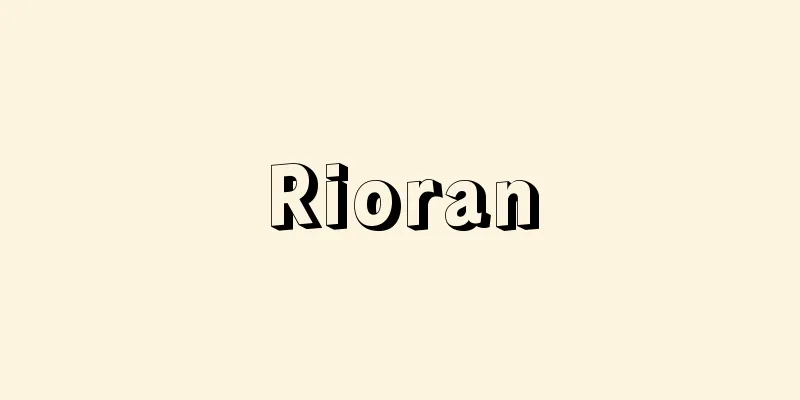Enlightenment - philosophy of the enlightenment
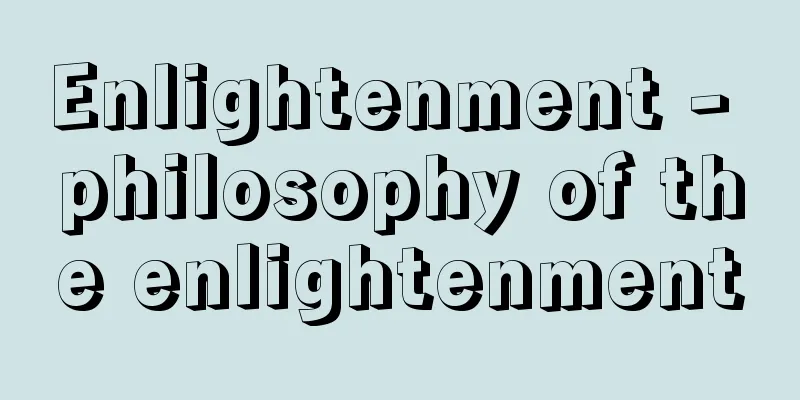
|
In a narrow sense, the Enlightenment refers to the intellectual and cultural movement that took place mainly in France, England, and Germany in the 18th century. In a broader sense, it is also used to refer to any movement that has characteristics that appear in the Enlightenment. "Enlightenment" means to open the ignorance of the masses through reason, and although there are similar meanings in Europe, its essential character is to be found in a critical spirit, a spirit of skepticism and denial. Therefore, rather than opening up ignorance, or in other words teaching and guiding, the idea that thoroughly criticizing and destroying the causes of ignorance leads directly to the path of truth is particularly strong among French thinkers. The criticism of religion represented by d'Holbach, the criticism of metaphysics by Condillac and others, and the strong social criticism seen in Diderot and Rousseau, which mercilessly criticized, mobilized, and relativized the existing established system and fixed things, are just as important as their own active claims of materialism and sensualism. However, it is also an important fact that thinkers such as Voltaire and Diderot had close ties with enlightened monarchs such as Frederick II of Prussia (reigned 1740-86) and Catherine II of Russia (reigned 1762-96). [Kazuo Sato] The spirit of denialTowards the end of the reign of the "Sun King" Louis XIV (reigned 1643-1715), the glory of the French Classical period collapsed and all previous cultural and political domination began to be relativized due to financial collapse caused by wars and extravagant spending by the court, and social unrest caused by religious intolerance following the abolition of the Royal Ordinance of Nantes. Thinkers such as Bayle and Fontenelle, who inherited Descartes' rationalist spirit, had already launched sharp criticisms of religious fictions such as superstitions about comets and oracles, and advocated a modern scientific spirit. Among them, Bayle mercilessly pointed out the errors in conventional knowledge with the completion of his "Critical Dictionary of History," shaking the foundations of existing ideology. With his religious tolerance that even tolerated atheists, and the spirit of skepticism that was the background to this, Bayle was the thinker who was the actual starting point of French Enlightenment. After the death of Louis XIV, French society began to move towards fluidity. Montesquieu, for example, argued against the previous tendency towards uniformity, arguing that different values exist depending on time and place. In "Letter from a Persian" he relativized French culture and society, and in "The Spirit of the Laws" he showed that the nature of law can differ depending on the climate. However, the most important criticism of this period was that of religion, and its representatives were materialists such as d'Holbach and La Mettrie. Their criticism that religion was the product of ignorance and deception, and that Christianity taught harmful morality, was representative of the Enlightenment. [Kazuo Sato] MaterialismTheir relentless criticism of reality was premised on the positive affirmation of real life. In response to the idea of viewing this worldly life negatively and valuing an ascetic religious life as good, a bold ideology was born that sought to affirm human life as it is. Secular life, including eating, drinking, and romance, was asserted as a positive value, and human happiness in this world became the standard by which everything was judged. As a result, in terms of epistemology, sensory experience was emphasized, in terms of ethics, utilitarian hedonism was established, and materialism, which places nature as an ontological principle, came to the forefront in place of the previous position of God. Materialists such as d'Holbach and La Mettrie tried to reduce everything, including the mind, to nature = body and develop a monistic worldview in order to refuse to incorporate the human into the religious otherworld. Of course, there were various currents in the Enlightenment as a whole, and in terms of religion, it can be said that there were more deistic understandings, but the point that they were based on human reason and nature remains unchanged. This bold affirmation of nature was the result of the rapid development of modern science and technology at the time, which made it possible for humans to achieve happiness through control over nature, as advocated by Bacon. Symbolic of this is the fact that the Encyclopedia, the brilliant achievement of this era by Diderot, d'Alembert and others, was named a "rational dictionary of science, technology and crafts." [Kazuo Sato] The idea of progressThe expansion of control over nature through the development of science and technology gave rise to the idea that human history progresses more as time goes on. A series of debates, such as the "Ancient vs. Modern" debate initiated by Perrault and Boileau at the end of the 17th century, and "Discourse on the Origin of Language" by Condillac, Rousseau and others, instilled a sense of history in people and shaped the idea of progress. Of particular importance was the belief in the possibility of human development. It came to be believed that, if given the necessary conditions through education, humans could progress and walk an infinite path to perfection. In fact, it can be said that the modern view of education was established by thinkers of this period, including Condorcet and Rousseau. What was important in their thought was that human reason was not perceived as a static, fixed reason as in the 17th century, but as a dynamic reason that develops while forming itself. Reason became connected to life and no longer existed apart from the environment and history. [Kazuo Sato] languageOne of the characteristics of this era is the attention paid to language. Although the influence of the linguistic theory of the British author Locke in An Essay on Human Understanding cannot be ignored, the strong interest in language shown by Condillac, Diderot, Rousseau, and even Herder in Germany is linked above all to the formation of the view of reason mentioned above. Reason, which appears as language, can no longer be separated from sensory experience, but is connected to the concrete dimension of each individual's life. In response to this, Enlightenment thinkers focused their attention on the issues of emotion and art. Thinkers from various countries, such as Shaftesbury, Hutcheson, Du Bos, Lessing, and Baumgarten, focused on the unique role of aesthetics and emotion. At the same time, they raised the issue of the origin of language from the viewpoint that desires and passions also play an essential role in the formation of cognition. [Kazuo Sato] toleranceThe Enlightenment destroyed the monolithic values and worldview of the past and relativized them, pointing out that what was previously considered rational was anti-rational when viewed from another perspective, and that what was good on one side was evil when viewed from another. Rousseau and Diderot pointed out that modern society itself contained such contradictions, and became the forerunners of the German thought of Kant, Hegel and others. This relativization of ideas was also in line with the establishment of the idea of tolerance in Europe. A variety of views on ideological tolerance were put forward against the backdrop of the constant religious conflict centered on the fierce strife between Protestants and Catholics. The theories of tolerance by such thinkers as Bayle, Locke, and Voltaire are interesting as they show the European character of modern democracy. [Kazuo Sato] "What is Enlightenment?" by Kant, translated by Shinoda Hideo (Iwanami Bunko)" "Philosophy in the Age of Enlightenment" by Châtelet, translated and supervised by Nozawa Kyo (included in Châtelet's History of Philosophy IV, 1976, Hakusuisha) " "Utopia and Reform in the Enlightenment" by F. Venturi, translated by Kato Kiyoshi and Mizuta Hiroshi (1981, Misuzu Shobo) Source: Shogakukan Encyclopedia Nipponica About Encyclopedia Nipponica Information | Legend |
|
啓蒙思想とは、狭義には、主として18世紀にフランス、イギリス、ドイツなどで行われた思想文化運動をさしていう。広義には、そこに現れた特徴がみいだされる運動一般に対しても使われる。「啓蒙」とは民衆の蒙昧(もうまい)さを理性によって啓(ひら)くという意味であり、ヨーロッパにおいても同様な意味内容がないわけではないが、その本質的な性格は批判的精神、懐疑と否定の精神に求められる。したがって蒙昧を啓く、いいかえれば教え導くというよりは、その原因となるものを徹底的に批判し破壊することがそのまま真理の道へ通じるといった考えが、とりわけフランスの思想家に強い。ドルバックに代表される宗教批判、コンディヤックらの形而上(けいじじょう)学批判、ディドロやルソーにみられる強烈な社会批判など、現存する既成の体制、固定的なものを容赦なく批判し、流動化し、相対化したことが、彼ら自身の唯物論、感覚論などの積極的な主張に劣らず重要である。 とはいっても、ボルテールやディドロなどの思想家が、プロイセンのフリードリヒ2世(在位1740~86)やロシアのエカチェリーナ2世(在位1762~96)らの啓蒙君主と深い関係にあったことも、重要な事実として見逃すことはできない。 [佐藤和夫] 否定の精神「太陽王」ルイ14世(在位1643~1715)治世の末期から、戦争と宮廷の乱費による財政破綻(はたん)、ナントの王令廃止による宗教的不寛容が引き起こした社会的混乱などにより、フランス古典主義時代の栄華は崩壊し、従来のあらゆる文化・政治支配が相対化され始めた。すでに、ベールとフォントネルというデカルトの合理主義精神を受け継いだ思想家が、彗星(すいせい)をめぐる迷信や神託占いといった宗教的虚構に対して鋭い批判を投げかけ、近代的な科学的精神を主張していた。なかでもベールは『歴史批判辞典』の完成によって、従来の知識の誤謬(ごびゅう)を容赦なく指摘して既存のイデオロギーの土台を揺さぶった。無神論者をも許容する宗教的寛容、その背景をなす懐疑の精神など、ベールはフランス啓蒙思想の実質的な出発点をなす思想家であった。 ルイ14世の死後、フランス社会は流動化に向かう。たとえばモンテスキューは、それまでの統一志向に対して、時代と場所によって異なった価値が存在することを主張した。『ペルシア人の手紙』ではフランス文化や社会が相対化され、『法の精神』では法のあり方が風土によって異なりうることが示された。しかし、この時代にもっとも重要な批判は宗教批判であり、その代表者はドルバック、ラ・メトリらの唯物論者たちであった。宗教が無知と欺瞞(ぎまん)の産物であり、キリスト教は有害な道徳を教えるものだとする彼らの批判は、啓蒙思想を代表するものであった。 [佐藤和夫] 唯物論彼らの仮借ない現実批判は、かえって現実生活の積極的肯定を前提としていた。現世の生活を消極的にとらえ、禁欲的な宗教的生活を善とする考え方に対して、人間生活のあるがままを大胆に肯定しようとする思想が生まれた。飲食や恋愛の世俗生活が積極的な価値として主張され、現世における人間の幸福がいっさいを判断する基準となった。その結果、認識論的には感覚的経験が重視され、倫理的には功利主義的な快楽主義がたてられ、これまでの神の位置にかわって自然を存在論的原理とする唯物論が前面に登場する。ドルバック、ラ・メトリらの唯物論者たちは、人間的なものが宗教的彼岸のうちに組み入れられるのを拒否するために、精神を含めたいっさいをいったん自然=肉体に還元し、一元論的な世界観を展開しようとした。もちろん、啓蒙思想全体にはさまざまな潮流が存在したし、宗教的にはむしろ理神論的な把握のほうが多かったといってもよいが、彼らが人間理性と自然を基礎にした点では変わらない。 このような自然の大胆な肯定は、当時、急速な発展を遂げた近代科学技術によって、ベーコンが提唱したような自然支配による人間の幸福の可能性がみえたからにほかならない。ディドロ、ダランベールらによるこの時代の輝かしい成果である『百科全書』が、「科学、技術、工芸の合理的辞典」と名づけられているのはその象徴である。 [佐藤和夫] 進歩の観念科学技術の発展による自然支配の拡大は、人間の歴史が時代を経れば経るほど進歩していくという考えを生み出していった。17世紀末、ペローとボアローに端を発した「古代近代論争」、コンディヤック、ルソーらにおける「言語起源論」などの一連の議論は、人々に歴史の意識を植え付けるとともに、進歩の観念を形成していった。 とりわけて重要なのは、人間の発展の可能性に対する確信である。人間は教育によって条件を与えられるならば無限に完成への道程を歩み、進歩していくものだと考えられるようになってきた。実際、近代的な教育観は、コンドルセ、ルソーらを始めとするこの期の思想家たちによって確立されたといってもよい。その思想において重要なのは、人間理性が17世紀的な静止した固定的理性ではなくて、自らを形成しつつ、発展する運動的理性としてとらえられていることである。理性は生活と結び付き、もはや環境と歴史を離れて存在するものではなくなったのである。 [佐藤和夫] 言語この時代を特色づけるものとして、言語への注目があげられる。イギリスのロック著『人間悟性論』における言語論の影響を無視することはできないが、コンディヤック、ディドロ、ルソー、さらにはドイツのヘルダーに至るまでの言語への強い関心は、なによりもまず前述のような理性観の形成と結び付いている。言語として現れる理性は、もはや感覚経験から断絶したものではありえず、個々人の生活の具体的な次元と結び付くものとなる。それに対応して啓蒙思想家たちは感情および芸術の問題に関心を集中した。シャフツベリ、ハチソン、デュ・ボス、レッシング、バウムガルテンなど各国の思想家たちが、美的なものや感情の独自の役割に注目した。と同時に彼らは、認識の形成にあたっても欲求や情念が不可欠な役割を果たしているという観点から、言語の発生の問題を提起していった。 [佐藤和夫] 寛容啓蒙思想は、これまでの単一的価値観や世界像を破壊して相対化し、従来理性的と考えられていたものも別の面からみれば反理性であり、一方で善であるものも他方からみれば悪であることを指摘した。ルソーやディドロらは、近代社会がそれ自体にこのような矛盾をはらんでいることを指摘し、カント、ヘーゲルらのドイツ思想の先駆者となった。 また、このような相対化は、ヨーロッパにおける寛容思想の成立と相応するものであった。プロテスタントとカトリックの激しい争いを中心とする絶えざる宗教的対立の過程を背景にして、思想の寛容をめぐるさまざまな見解が出された。ベール、ロック、ボルテールらの寛容論は、近代民主主義のヨーロッパ的性格を示すものとして興味深い。 [佐藤和夫] 『カント著、篠田英雄訳『啓蒙とは何か』(岩波文庫)』▽『シャトレ著、野沢協監訳『啓蒙時代の哲学』(『シャトレ哲学史Ⅳ』所収・1976・白水社)』▽『F・ヴェントゥーリ著、加藤喜代志・水田洋訳『啓蒙のユートピアと改革』(1981・みすず書房)』 出典 小学館 日本大百科全書(ニッポニカ)日本大百科全書(ニッポニカ)について 情報 | 凡例 |
Recommend
Anamizu Yoshichi
1875-1929 A businessman and politician from the M...
The Sainte Anne School (English: L'École de Sainte Anne)
A school of French psychiatry. Just as Paris was t...
Tale of the Open-air Court - Tale of the Open-air Court
A kana zoshi (traditional Japanese story). Author ...
Trust bank - Shintakuginko
Among ordinary banks that also operate trust busi...
Langendijk, P.
… In the following 18th century, poets and writer...
Illustrated biography of the Eastern Expedition
This picture scroll depicts the achievements of th...
McCarey, Leo
Born October 3, 1898 in Los Angeles, California. [...
Yoshitaro Hirano
Marxist legal scholar and social activist. Born i...
Nouveau riche - Narikin
A person who accumulated wealth in a short period...
Photochemical sensitization
A type of photochemical reaction in which a substa...
Gyokuryu Snow Mountain
…The district office and autonomous county govern...
Appeldern, A.von - Appeldern
… [history] Riga was once the homeland of the Fin...
Outside the institution - Ingaidan
An action group made up of party members who beca...
Coral vine
...An evergreen, climbing, semi-shrub of the Poly...
separate school
…This was to protect the educational rights of mi...

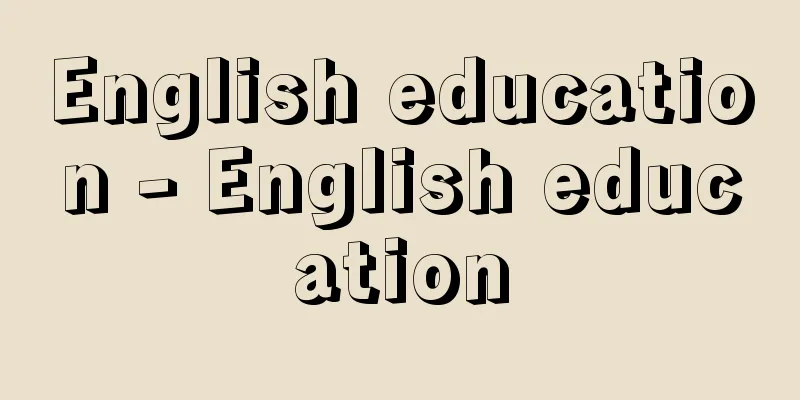

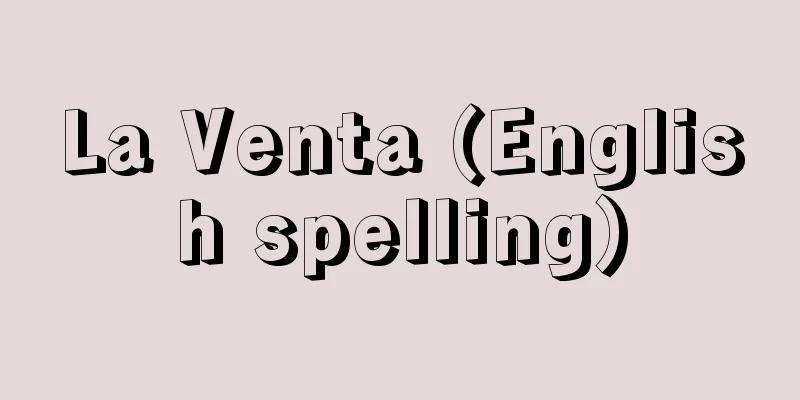
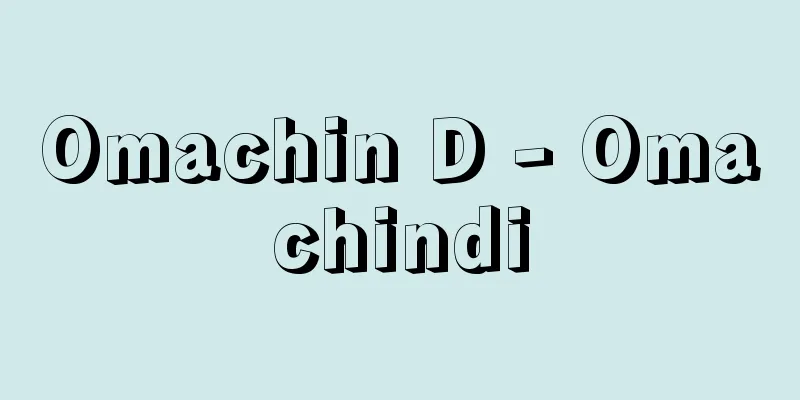
![Konan [town] - Kounan](/upload/images/67cb8b13867e8.webp)

